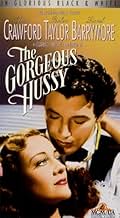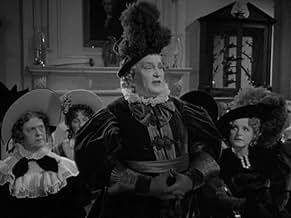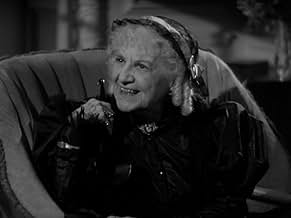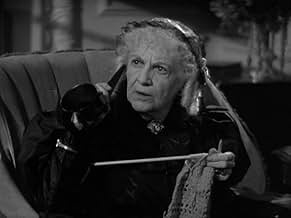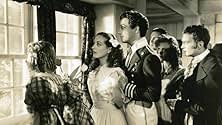IMDb RATING
5.6/10
1.5K
YOUR RATING
President Andrew Jackson's friendship with an innkeeper's daughter spells trouble for them both.President Andrew Jackson's friendship with an innkeeper's daughter spells trouble for them both.President Andrew Jackson's friendship with an innkeeper's daughter spells trouble for them both.
- Director
- Writers
- Stars
- Nominated for 2 Oscars
- 4 wins & 2 nominations total
Rubye De Remer
- Mrs. Bellamy
- (as Ruby de Remer)
- Director
- Writers
- All cast & crew
- Production, box office & more at IMDbPro
Featured reviews
'The Gorgeous Hussy' had a lot of potential to be good. The subject sounded really interesting. Clarence Brown may not be one of my favourite directors, but he did do some good films. His films more often than not looked great and he was often very good in his direction of his lead actresses, a prime example being Greta Garbo. Have always loved period drama films. Plus who can resist a cast with the likes of Joan Crawford, Lionel Barrymore, Melvyn Douglas and Beulah Bondi in the same film?
Sadly, the film was a pretty major disappointment. There are certainly far worse films out there and it has its good things, but a story that actually is a lot more interesting than the film made it deserved better. As far as Brown's films go it is a lesser effort and it is a lesser effort of Crawford's too, both film and performance. Everybody, even the few actors that came over well, did a lot better both before and since (primarily since as some of the cast are in early roles).
Certainly there are good things. The best asset is the production values. It is sumptuously designed and costumed and even better is the cinematography, it clearly loved Crawford who didn't always look this luminous at this point of her career. The best performance belongs to Barrymore, he has the juiciest character and gives the role so much zing and enthusiasm (it may not be what one calls a subtle performance but then again Barrymore was not a subtle actor, which is not actually a bad thing in his regard).
Bondi also comes over very well, making the very most with what she was given. The score is not too over-bearing or melodramatic.
Most of the cast disappoint. Crawford to me was too mannered in her role and never seemed to gel with the setting with too modern a look. Douglas, Robert Taylor, Franchot Tone and James Stewart all gave their fair share of good performances, but all four are dull in sketchy roles. Tone is particularly wronged and doesn't look comfortable with dispiriting material. Brown's direction at best is undistinguished and quite leaden.
Also felt that the story never properly engaged, with too deadingly dull a pace and with too much narratively being too uneventful. It is a shame too that the story didn't have the same amount of juice and venom that the character of Andrew had and took on a far too careful approach that made the film feel very safe. The script is well intentioned, but came over as too talky and preachy.
Summarising, rather lacklustre though not without good things. 4/10
Sadly, the film was a pretty major disappointment. There are certainly far worse films out there and it has its good things, but a story that actually is a lot more interesting than the film made it deserved better. As far as Brown's films go it is a lesser effort and it is a lesser effort of Crawford's too, both film and performance. Everybody, even the few actors that came over well, did a lot better both before and since (primarily since as some of the cast are in early roles).
Certainly there are good things. The best asset is the production values. It is sumptuously designed and costumed and even better is the cinematography, it clearly loved Crawford who didn't always look this luminous at this point of her career. The best performance belongs to Barrymore, he has the juiciest character and gives the role so much zing and enthusiasm (it may not be what one calls a subtle performance but then again Barrymore was not a subtle actor, which is not actually a bad thing in his regard).
Bondi also comes over very well, making the very most with what she was given. The score is not too over-bearing or melodramatic.
Most of the cast disappoint. Crawford to me was too mannered in her role and never seemed to gel with the setting with too modern a look. Douglas, Robert Taylor, Franchot Tone and James Stewart all gave their fair share of good performances, but all four are dull in sketchy roles. Tone is particularly wronged and doesn't look comfortable with dispiriting material. Brown's direction at best is undistinguished and quite leaden.
Also felt that the story never properly engaged, with too deadingly dull a pace and with too much narratively being too uneventful. It is a shame too that the story didn't have the same amount of juice and venom that the character of Andrew had and took on a far too careful approach that made the film feel very safe. The script is well intentioned, but came over as too talky and preachy.
Summarising, rather lacklustre though not without good things. 4/10
If you think Joan Crawford is gorgeous, you're in much better shape than I was to watch The Gorgeous Hussy, since she plays the title character. Despite what the title leads you to believe, this is a movie about President Andrew Jackson. Lionel Barrymore plays the beloved president, and he puts his whole heart into the many speeches the script provides. Beulah Bondi plays Rachel Jackson, and in case you don't know your history, I won't tell you anymore, except that she was nominated for Best Supporting Actress in 1937.
Where does Joan Crawford come in, and why is the movie named after her? She's Jackson's niece, and she's desperately in love with a much older senator, Melvyn Douglas. When he sends her away for her own good, she throws herself into a relationship with the second man who flirts with her, Robert Taylor. A very young, gawky James Stewart is the first man, but she doesn't want anything to do with him. Robert is handsome and flirtatious, but he's also a sailor and therefore a little untrustworthy.
Joining the cast is Joan's then-husband Franchot Tone, Louis Calhern, and Gene Lockhart. The film alternates between a political drama and a love triangle between Joan, Melvyn, and whichever guy Joan is flirting with at the moment, hence the title. If you know your trivia about Gone With the Wind, you'll know that Melvyn Douglas was on the short-list for Ashley Wilkes, and after you watch this movie, it's easy to imagine him running circles around Leslie Howard's performance. He would have been a wonderful Ashley Wilkes, and if you agree, rent this movie for the next best thing.
Where does Joan Crawford come in, and why is the movie named after her? She's Jackson's niece, and she's desperately in love with a much older senator, Melvyn Douglas. When he sends her away for her own good, she throws herself into a relationship with the second man who flirts with her, Robert Taylor. A very young, gawky James Stewart is the first man, but she doesn't want anything to do with him. Robert is handsome and flirtatious, but he's also a sailor and therefore a little untrustworthy.
Joining the cast is Joan's then-husband Franchot Tone, Louis Calhern, and Gene Lockhart. The film alternates between a political drama and a love triangle between Joan, Melvyn, and whichever guy Joan is flirting with at the moment, hence the title. If you know your trivia about Gone With the Wind, you'll know that Melvyn Douglas was on the short-list for Ashley Wilkes, and after you watch this movie, it's easy to imagine him running circles around Leslie Howard's performance. He would have been a wonderful Ashley Wilkes, and if you agree, rent this movie for the next best thing.
MGM in trying to expand Joan Crawford's repertoire into period costume pieces spared no expense and gave her one all star cast in this drama about the Peggy O'Neal Eaton affair. The basic facts are true, Peggy O'Neal, daughter of a Washington, DC tavern-keeper and widow of a young Navy Lieutenant, marries the Senator from Tennessee who then is chosen Secretary of War in President Andrew Jackson's original cabinet. The Cabinet wives however refuse to receive Peggy socially as does the wife of the Vice President John C. Calhoun. Jackson blows his cabinet up, requests resignations from all involved and Eaton and Peg are sent in exile so to speak as he is made Minister to Spain.
The real story is far more complex than that. Jackson did regard Peggy as a slandered woman, much like his late wife Rachel was. Rachel Donelson Robards Jackson dies between the election and inauguration of Jackson. Beulah Bondi plays her in the movie and it's the best performance in the film. In real life this whole affair was being maneuvered behind the scenes by John Calhoun and Secretary of State Martin Van Buren taking anti and pro Peggy positions respectively. Van Buren's character is barely mentioned here. Played by Charles Trowbridge, he's given one or two lines in the film.
Robert Taylor strikes the right note as the young Naval Lieutenant Bow Timberlake. After Timberlake and Peggy are married, he is ordered to sea and dies there. The manner of his death has never been satisfactorily explained. It's also not explained here and that leaves the audiences up in the air.
Franchot Tone plays John Eaton and I think a lot of his performance is left on the cutting room floor. In real life there is some question as to whether Eaton and Peggy were involved while she was married to Timberlake.
But the most fantastic error in this plot is John Randolph's interest in Peggy. The real John Randolph was impotent, his testicles never descended, he never reached puberty. He never had any romantic attachments with anyone, he wasn't capable of it. In real life John Randolph because he never reached puberty had this girlishly high-pitched voice when he spoke on the floor of Congress. No one ever dared make fun of him though as he was a crack shot with a dueling pistol. Melvyn Douglas played a character with no basis in reality.
One of the other things I found a bit much was Douglas's constant prattle about state's rights. To him this a nice philosophy to be debated on the floor of Congress. Louis Calhern's character who is admittedly like a previous reviewer describes him as a Snidely Whiplash villain, is ready for secession. He goes to Randolph and says that he's organized a movement and he wants Randolph to lead it. The real Randolph would have been hot to trot for that. Melvyn Douglas reacts in horror however, he threatens to expose Calhern's villainy. Calhern has to shoot him. But if you think about it, the only thing Calhern did was take that state's right talk of Douglas to its logical conclusion and translate it into action.
The real John Randolph was never assassinated, he died of natural causes and had no major role in the Peggy O'Neal affair at all.
Maybe some day someone will make a better film of this incident.
The real story is far more complex than that. Jackson did regard Peggy as a slandered woman, much like his late wife Rachel was. Rachel Donelson Robards Jackson dies between the election and inauguration of Jackson. Beulah Bondi plays her in the movie and it's the best performance in the film. In real life this whole affair was being maneuvered behind the scenes by John Calhoun and Secretary of State Martin Van Buren taking anti and pro Peggy positions respectively. Van Buren's character is barely mentioned here. Played by Charles Trowbridge, he's given one or two lines in the film.
Robert Taylor strikes the right note as the young Naval Lieutenant Bow Timberlake. After Timberlake and Peggy are married, he is ordered to sea and dies there. The manner of his death has never been satisfactorily explained. It's also not explained here and that leaves the audiences up in the air.
Franchot Tone plays John Eaton and I think a lot of his performance is left on the cutting room floor. In real life there is some question as to whether Eaton and Peggy were involved while she was married to Timberlake.
But the most fantastic error in this plot is John Randolph's interest in Peggy. The real John Randolph was impotent, his testicles never descended, he never reached puberty. He never had any romantic attachments with anyone, he wasn't capable of it. In real life John Randolph because he never reached puberty had this girlishly high-pitched voice when he spoke on the floor of Congress. No one ever dared make fun of him though as he was a crack shot with a dueling pistol. Melvyn Douglas played a character with no basis in reality.
One of the other things I found a bit much was Douglas's constant prattle about state's rights. To him this a nice philosophy to be debated on the floor of Congress. Louis Calhern's character who is admittedly like a previous reviewer describes him as a Snidely Whiplash villain, is ready for secession. He goes to Randolph and says that he's organized a movement and he wants Randolph to lead it. The real Randolph would have been hot to trot for that. Melvyn Douglas reacts in horror however, he threatens to expose Calhern's villainy. Calhern has to shoot him. But if you think about it, the only thing Calhern did was take that state's right talk of Douglas to its logical conclusion and translate it into action.
The real John Randolph was never assassinated, he died of natural causes and had no major role in the Peggy O'Neal affair at all.
Maybe some day someone will make a better film of this incident.
Fanciful, but silly biography of Peggy Eaton (Crawford), a controversial figure during the Andrew Jackson administration in the late 1820s, and her relationships with influential men of that era. Semi-fiction story is "gorgeous" to look at thanks to elegant period settings and costumes, not so much the performances or script.
No! No! No! What is that most modern, at least to her time, of actresses Joan Crawford doing in hoop skirts and crinoline? Pretty much making a fool of herself, not that it's her fault MGM should have known better. There is not one look or gesture that she makes that has a feeling of any period but the 20th century.
Both stagnant and silly this completely miscast picture takes an interesting and scandalous piece of American history, The Petticoat Affair, and make it seem asinine and trivial when it practically tore Jackson's presidency apart and did lead to most of his cabinet's resignation.
Proof positive that not every film that came out of Hollywood's golden age and its premiere studio was a classic worth seeing filled with top flight talent or not. Even if you are a completist of any of the stars work this will be a struggle to get through.
Both stagnant and silly this completely miscast picture takes an interesting and scandalous piece of American history, The Petticoat Affair, and make it seem asinine and trivial when it practically tore Jackson's presidency apart and did lead to most of his cabinet's resignation.
Proof positive that not every film that came out of Hollywood's golden age and its premiere studio was a classic worth seeing filled with top flight talent or not. Even if you are a completist of any of the stars work this will be a struggle to get through.
Did you know
- TriviaAccording to Melvyn Douglas, Joan Crawford got herself to cry by listening to recordings of "None but the Lonely Heart".
- GoofsThey are singing "Wait for the Wagon" on the hayride, but it wasn't written until 1850. "America" and "Listen to the Mockingbird" were not written at this time either.
- Quotes
Daniel Webster: Well Miss Peggy, have you shaped any new political doctrines today?
Peggy Eaton: Ah Mr. Webster, I'm just an impressionable young woman.
- Crazy creditsPrologue: "This story of Peggy Eaton and her times is not presented as a precise account of either--rather, as fiction founded upon historical fact. Except for historically prominent personages, the characters are fictional. The city of Washington in 1823--heart of a country not yet a century old, not yet beyond an occasional growing pain."
- ConnectionsFeatured in Great Performances: James Stewart: A Wonderful Life (1987)
- SoundtracksAmerica, My Country Tis of Thee
(uncredited)
Music by Lowell Mason
Music based on "God Save the King" written by Henry Carey
[Played in the opening scene as part of the score]
- How long is The Gorgeous Hussy?Powered by Alexa
Details
- Release date
- Country of origin
- Language
- Also known as
- La divina coqueta
- Filming locations
- Production company
- See more company credits at IMDbPro
Box office
- Budget
- $1,119,000 (estimated)
- Runtime
- 1h 43m(103 min)
- Color
- Aspect ratio
- 1.37 : 1
Contribute to this page
Suggest an edit or add missing content


